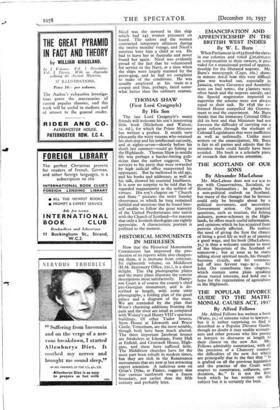EMANCIPATION AND APPRENTICESHIP IN THE BRITISH WEST INDIES By W.
L. Burn
When Parliament in 1833 freed the slaves in our colonies and voted £2o,doo,o30 as compensation to their owners, it pro- vided for a transitional period of appren- ticeship for the liberated negroes. Mr. Burn's monograph . (Cape, i6s.) shows in minute detail how this very difficult plan was worked out, especially in Jamaica, where Governor and Assembly were on bad terms, the planters were often harsh and the negroes unruly, and the Special magistrates imported to supervise the scheme were not always equal to their task. By 1838 the formed House compelled the Govern- ment to end the experiment. Mr. Burn thinks that the immature Colonial Office did its best and that Ministers had not foreseen the difficulty of carrying out a great reform through the medium of Colonial Legislatures that were inefficient as well as unfriendly. Unlike most writers on the emancipation, Mr. Burn is fair to all parties and admits that the mistakes made could hardly have been avoided. His book is a scholarly piece of research that deserves attention.






















































 Previous page
Previous page